“Jordan plays ball
Manson kills people
I talk”
Nick Naylor, Thank You For Smoking
Of all my personal and professional interests, the one common thread is people. I’m fascinated with the human experience. My leisure time, the jobs I‘ve worked, even the subjects I’ve studied in school, all involve people. It’s a very broad category of interest.
Besides the whole gamer/gaming identity of the last decade, I did take the time to pick up a degree in Applied Psychology. For a while I wanted to be a therapist, and while my career path has changed since then, I still like the tenets. For example, some therapists believe a person is prevented from being their core self through external and internal forces. The internal static is things like depression, social anxieties, narcissism, etc. It’s really where my focus has been. External stuff is like racism, sexism, economic forces: things not so personal. I’m still in the midst of learning about social justice, although I think we can all agree the game needs more women and people of color. However, that’s a topic for another day.
My first psychological/gaming article was Gamers and Depression. It definitely struck a chord with a lot of readers. Depression is certainly a force that can alter a person’s core self, preventing them from experiences they would enjoy. This time I’d like to go in the opposite direction, and examine ways a person can feel better than their baseline self. It’s a special state that gives a person extra joy and satisfaction than a task normally would. Luckily for players of this game, that special state doesn’t just equate to pleasant feelings… it also vastly increases skill and opportunity. This area has been mentioned occasionally in reports, but rarely defined. Worse, I’ve never seen an article dealing with how to create this opportunity in one’s self; usually it merits little more than a passing mention before the author explains how he or she won the tournament. So let’s examine the details of this mental state, as well as ways to achieve it. Peak performance, flow, self-actualization; all refer to being in The Zone
The Zone is the Holy Grail of playing Magic; of being, really. It’s the state of mind where you can do no wrong, all the pieces fit, and every move is a happy one. Simply put, The Zone is where we wish we could spend all of our time. The trick isn’t just recognizing its benefits, its also actually getting there. That particular journey is a difficult, very individual experience. Getting into The Zone is tough because it requires a lot of factors to fall into place, which we’ll get to in time. Before all that, what exactly does it mean to be “in The Zone?”
That’s tougher to answer than you may think, since again, it is so personalized. I’ll give you my version, and maybe you’ll see some similarities in your own, or at least something to strive for.
When playing Magic, I’m in one of three places. In order of quality, they are:
1. Thinking about decisions and making the wrong one.
2. Thinking about decisions and making the right one.
3. Not needing to consciously reflect at all, because I know the best move (and I’m right).
Number three is where it’s at, of course. However, just playing well does not do justice to the feelings of positivity one gets while participating in this peak state. There are also sensations of happiness, of calm, satisfaction, and legitimacy. It’s as if you’re exactly where you should be, doing exactly what you’re supposed to. It’s that feeling that your opponents should be scared about, far more than matchups or mulligans.
Besides a Zen inside, there’s an external component to being in The Zone. For me, my jokes are funny. I don’t feel hungry, I don’t feel ill, I don’t feel much of anything in the physical sense. Time seems to move slightly slower, so that I have a greater awareness of my surroundings. If ever I were to make a move against Teddy K, Zone Time would be my best shot (it would bring my chances up to a high zero).
I know these are all characteristics, rather than a definition. Like certain other materials, a Zone state is easier to recognize than define. Just to take a shot at it:
Zone is a state of mind and body where your thoughts and responses are in alignment, where you are completely focused and completely satisfied by the task at hand.
“Ah ha,” the observant biochemist might be saying. “That’s not any kind of special mental state, that’s just adrenaline in your veins. You’re just feeling an adrenal response to an exciting stimulation.”
A bit snarky, but that statement is true to an extent. Adrenaline is a factor, and it can explain some of the characteristics of Zone-like behavior, such as negating hunger. However, adrenaline definitely does not account for everything. As we’ll explore down the road, part of achieving a peak state is putting yourself in the position of achieving an adrenal response. Adrenaline is one of the chemicals released in stimulating situations, prompting the so-called “flight-or-fight” response. I’ve said it before, but those serious Magic tournaments are like combats to the death as far as brain response is concerned. Anyone who’s read Ender’s Game and had it ring true for them knows exactly what I’m talking about. I ask though, since anyone reading this has at one time or another felt adrenaline course through their veins… when you feel that hormone, do you also feel happy? Content? Not me. For those positive feelings of contentment and harmony, something more is needed. Adrenaline, you see, is spurned by an outside source. Yes yes, it’s produced by the body… but the trigger is something external, like a threat or a lottery drawing. To get the X-factor, that feeling of alignment, we must turn inward. This particular journey has a whole science dedicated to exactly that.
One of Psychology’s greatest theoreticians was a scientist by the name of Abraham Maslow. Maslow was a pioneer of the humanist branch of psychology. Briefly, humanistic theory says humans are good and we’re all striving to reach our potential. Contrast this with Freudian psychology, which says we all want to sleep with our mothers, who in turn were deeply jealous of our father’s penis. Can you guess which school of thought was more popular?
Maslow’s most famous contribution to modern thinking was a pyramid of human necessities. It’s like the USDA food pyramid, except the food pyramid is on the base level of this one. Accurately, it’s called Maslow’s Hierarchy of Needs.
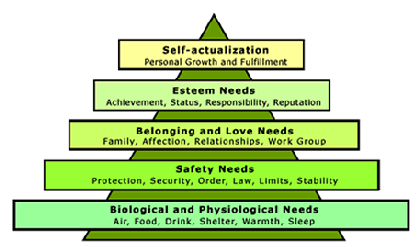
Feel free to differ with the order, but I think most people agree the bottom tiers are true enough. It’s the peak, “Self-Actualization”, that’s a little more amorphous. Certainly worth an article or two, methinks.
Self-Actualization is the Ideal You, stripped of all neurosis, inhibitions, fears, doubts, lust, jealousy; pretty much anything day to day that trips us up. All the needs below self-actualization in the pyramid are covered, so that you simply do not feel worried about food or money or companionship. You can focus on being You. Here’s the thing about self-actualization as Maslow described it: It’s very hard to get there. It’s possible we’ve met a few people in our lives who were self-actualized. Maslow’s examples of the group included Abraham Lincoln, Eleanor Roosevelt, Jane Adams, Gandhi, and a few other very notable figures. Based on his research, Maslow thought 2% of the population would be self-actualized. I think it’s actually much lower, at least in this country, but maybe that’s a factor of the people I spend time with. Regardless, there aren’t too many Lincolns walking around.
However, there is good news for those who are interested in reaching their ideal self. Maintaining the state is quite tough, but it is a bit easier to temporarily touch actualization. If the factors are in place, anyone can be self-actualized for moments. That, the gracing of your core self, is called a Peak Moment, or a Flow Experience. Or, being in The Zone.
Later on in his work, Maslow acknowledged the difficulty of achieving self-actualization, instead suggesting it as a goal that people can aspire to, rather than actually reach. He did also discuss those self-actualizing moments as attainable, but did not live long enough to put a ton of research in that exact tenant. In modern times, there is a scientist who does specialize in this field. Mihaly Csikszentmihalyi is the scientist who created the term “flow experience” and his work almost solely is dedicated to researching these pinnacles of human experience. I first came across the name of Dr. Csikszentmihalyi when researching this very subject for a school paper a few years ago. For further ideas for this article, I picked up a book by Dr. Csikszentmihalyi called Flow: The Psychology of Optimal Experience*. The book has some interesting ideas in there, some I agree with and some I don’t. If this subject does interest you, I would recommend picking this up for a look. Perhaps the readers have other book suggestions on this topic?
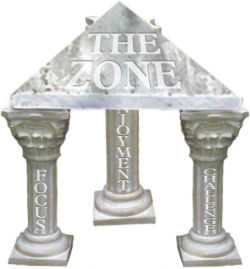
Enough groundwork, let’s look at actually achieving the state. In my view, there are three key pillars in hitting The Zone. They are focus, challenge, and enjoyment. Each pillar is equally important, which means if something isn’t there, Zone won’t happen. In more detail:
Focus
This is hard to pin down, and often the hardest to control. Focus means being free of distraction, of things that can prevent you from giving your absolutely full attention to the matter at hand. Unfortunately, there are near-infinite things that can remove you from your concentration.
Waking up with a cold is an excellent way to lose focus ability. Every time you have to turn your head to sneeze, or every time you pause an attack to grab a fresh Kleenex, you’re off your game. Now I won’t say you can’t win a tournament physically hindered; you could be bleeding from your scalp and still shuffle a deck. I will say every time your opponent gets nauseous from your runny nose (or a head wound), focus is going to look like a pipe dream.
A mother in the hospital, unpaid bills, a late term paper; anything can be a distraction. It doesn’t have to end you, but as far as being in The Zone, it’s simply not a possibility. All of those little life bits aside, your opponent is going to try his best to kick you off your focus too. It’s pretty intuitive, which is why a lot of successful players have a very good talking game. Even if your bills are paid and your opponent is a mime, you can cause yourself all kinds of emotional distraction. How many players have you seen just give up after a double mulligan? Ever see someone slump their shoulders when they face their worst matchup? Maybe they had focus in the beginning, but just a little adversity throws it out the window.
Dropping focus isn’t anything to be ashamed of; I’ve never met anyone who had consistently perfect focus. It’s a lifelong task for certain. All I can recommend is to actively track your focus levels when involved in any project, Magic or otherwise. Finding your trends, good focus is re-creatable with practice. Lots and lots of practice. And that’s only the first third of the equation!
Challenge
This one is cool. To achieve a flow state, your abilities must be stretched. This is half of what makes the experience such a personal one, since only you know what you’re really capable of. In Magic, that means trying new things against new opposition. Online play is terrible for focus, since you can so easily have the TV on or a poker table going. On the other hand, it’s absolutely great for giving yourself new challenges. Some of the best players in the world are literally a mouse-click away.
Regardless, to achieve a peak state you must literally be working at it. Your skills, at whatever level, must be tested to your limits. What those limits are may take some investigation. Yet the more you learn about something, the less mysterious and unconquerable it appears. Is there ever a time you know how much you don’t know?
Yes indeed, and games are the perfect solution. Even after you learn the rules and the beginner stuff, there are always new strategies and counter-strategies to learn. Your opposition and what they do will certainly change. Even better, in the case of some games — Magic, for example – the tools of the game itself will be altered over time. New sets, and even new rules, will be provided for you to master all over again.
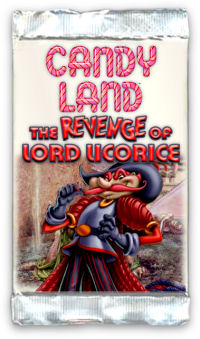
Even with this, a game does not have to be challenging just because it changes. I consider myself a grand master at Candyland, expansion packs notwithstanding. Even differentiation in my opponents (two year olds, three year olds, even four year olds), the challenge will not be there. I suppose a petty person could generate some satisfaction from beating up small children. But a feeling of all cylinders firing, with perfect mental alignment, satisfaction, and contentment? Not bloody likely.
The converse to the challenge clause is that while the subject must be taxing, it cannot be insurmountable. Some situations I have felt The Zone were Poker, Magic, and theater. These were arenas where there were serious challenges, but I knew if I gave my all, I would come out ahead. On the flip side, I’m decidedly mediocre in chess or Scrabble, and near-abysmal in something like Starcraft (I really like the Yamato gun). I’m fully cognizant that at this stage of my abilities, even giving my fullest would not result in success against even moderately talented people. I’m okay with that, and sometimes there’s value in getting thoroughly whipped by someone of skill, just to see someone of skill at work. Regardless, it will not give a peak moment.
The challenge aspect is a personal one, in that only you know your limits. Examine why you’re doing something if the challenge isn’t there, and if its time to step it up. I know for something like exercise, you need to constantly add weight to improve. It seems the mind works in a similar way.
Enjoyment
This one is even more personal, and requires a real understanding of your own psyche. What’s fun to you? What do you actually like doing? What do you wish you were doing?
Challenge and focus will help, but if you don’t enjoy what you’re doing, it’s not going to lead to the final level. If someone were to hold a gun to my head unless I calculated the cosine of something, I could probably do it. I’d absolutely hate it of course, and at this point I’m speaking of the TI-83, not the pistol. Math is not something I enjoy or am particularly good at. You can give me an accessible challenge and perfect motivation, but if I’m not going to have fun, I’m certainly not going to have a peak moment.
On the reverse, I consider myself a bit of an entertainer. I’m a sucker for an audience. For me, in Magic at least, I can’t achieve an idealized state without people to crack wise to, or at least spectate. It’s a trait I know about myself, and that awareness gives me an opportunity for a peak moment. I know what I enjoy, and that’s a first step to a lot of very good things. For example, I also enjoy strategy, competition, being forced to think quickly, being innovative, stakes, and maybe just a pinch of dream crushing. That recipe, in part, is what I need to reach The Zone. What’s yours?
Maybe the aspect you enjoy most about games is the winning? Then, my friend, you’re in trouble. You are placing your mental potential on an external factor, something you cannot fully control. Trust me when I say I’m a very big fan of winning, but because of that, trust me when I also say if that’s your sole reason to play, you’re in for a rough ride. I say this from experience, because my reasons for playing have been very different event to event. Sometimes it’s for the prize, and sometimes it’s for the process. Strangely, I always seem to do better when I’m playing for the sake of playing, and not for some external brass ring.
Mark Rosewater, that eminent social scientist, has had things to say regarding this topic. In his latest Spike/Johnny/Timmy article, he stated that Timmy is defined, more than anything else, by loving the process of deckbuilding. Spike and Johnny are characterized by needing to prove something, Johnny to himself and Spike to other people. Of course, that road leads to ruin, those results-oriented goals. Just read the message boards of that column, and you’ll see post after post of how Spike sucks the fun out of an event. To that I say, the fun-sucking Spikes probably weren’t very successful Spikes. Spike is sad when he’s losing and Johnny is sad is when his grand combo is failing. Timmy? Not so much; it’s hard to fail when you control every aspect of what’s important to you. I guess Timmy could hit his funny bone on the way to sleeve a Krosan Cloudscraper, but you get the idea. Need further proof? Check out these pictures of Timmy, Power Gamer and Johnny, Combo Player.
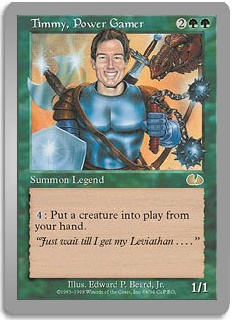
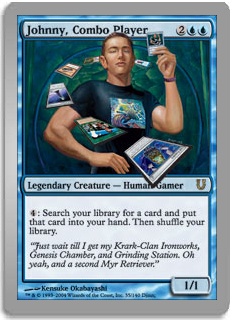
Timmy is one happy dude. Johnny just looks like he needs a hug.
“Oh, I am so tough in my Stifle shirt, please do not point out I need external validation to feel good about myself”.
I could say enjoy what you do and it would be good advice, if a bit banal. But this is a strategy article, and enjoying what you’re doing is good strategy! You’ll simply play better and win more while enjoying the process. The fact that you won’t mind losing as much is just a nice bonus. The simple secret is that the Spike that acts like a Timmy is going to win more, something Spike apparently cares most about. There’s no blissful ignorance here; self-knowledge about what you enjoy will set you free. I’ve met some incredibly competitive people, and no one says they play just for the winning. I’ve never met a happy person who did what he loved for any other reason but for the act of doing it, consequences be damned. Identify what makes you happy and incorporate it into your game. Do you like to sing? Why not a few bars as you’re attacking? Maybe you’re into writing. Why not play a tournament and be on the lookout for cool scenarios and fun anecdotes to talk about? A natural-born strategist? Hey, you’re in the right place.
So you’ve got your bills paid, your dogs walked, the oven’s turned off. You’re just about to play round 1 of your first Pro Tour, and you’re so excited! It’s going to be fun! Looks like everything could be in place, right? Well, sadly no. Here’s the caveat to whole zone process: It’s really rare. I’ve played over 3,300 sanctioned matches in my life and I’ve been in the peak place for maybe 20-30. Matches, not tournaments. I’ve given those three pillars because I believe they are universal requirements, but challenge/fun/focus is not the whole story. Everyone has his or her idiosyncrasies, and only through trial and error will you find your own path. Even then, it just might not be your day. Stuff happens, there’s always another tournament.
However, if your goal is peak performance, there are certain things you can do to jumpstart the process. These may not help you reach The Zone, but they might just be enough to boost your skills up a match win or two. I know for myself, tournaments these days start at an ungodly hour; sometimes you have to be awake by 8am! If you’re not a sparrow, I recommend:
Jumptart Your Body:
Do something physical, get that blood flowing. Take a walk, take a run, have an impromptu wrestling match in your hotel room… there are a lot of possibilities. My preference? Dance Dance Revolution. I am so absolutely horrid at this game, but I’m not playing it to win. It’s a quick shot of endorphins with up-tempo music and just a hint of competition, so it works for me. You live in physical space; I’m sure there’s something out there. Oh, and eat breakfast! Fuel for the fire, baby. My last PTQ I basically ate nothing the whole day and played great… up until the finals. Yeah.
Jumptart Your Mind:
You’re playing a Magic tournament in an hour, perhaps a little Magic with your granola bar? Presumably, due to reading this sentence, you have Internet access. Fire up Magic Online and play a draft or league game before that Sealed tournament. Or play some Type 2 in the casual rooms before the big Constructed event. Don’t worry about losing or winning, your confidence is not an issue. It’s simply a step to get your mind aligned with the day ahead. The whole point of flow is alignment, may as well get started with some risk-free games.
The other option is something non-Magic related, like a crossword puzzle or Sudoku. Heck, just read a newspaper and think about local issues. Anything to get your brain out of first.
My favorite method of the brain massage is no sleep, populated with either hours of late-night gaming, or an all night drive filled with strategic and philosophical conversations. No need to stimulate your brain if it never sleeps. That particular technique has qualified me for six Pro Tours, but your body is in misery by the end of the 48th hour. I haven’t done this in years so I don’t know if it still works. The all-nighter is probably just a trick for young people with irresponsible parents. Thanks Mom!
Hitting The Zone is your own personal Shangri-La, that metaphysical Earthy paradise. It’s not your happy place, it your you place. There are some people reading who know exactly what hitting that mental peak in Magic, or in any competition, is like. They know the content, smooth feeling of doing well at exactly the place you’re supposed to be.
For those that don’t think they’ll ever care or enjoy enough about games to get that far, no problem. As a human being, you still have the capacity to experience that quality in anything you do. Going back to the Candyland example, what if we replace a random toddler with your daughter? Now your goal isn’t to win, but to impart all kinds of life lessons while still having fun with your kid. I have to imagine a parent can find a flow state in that kind of experience all the time.
In the end, it’s about you. What you want, what you offer. This game can provide a lot of resources to anyone who’s looking for them, and a lot of heartache besides. By keeping your motivations simple and attainable, you can get that harmonious feeling. Please understand, being in The Zone won’t make you better than you already are. By being in The Zone, you’ll simply play at your best, no more and no less. Read articles, practice and learn, absolutely. It’s when it’s time to apply that knowledge, to have those skills at the ready, you’re going to be glad you have the techniques to bring that knowledge to the forefront, ready to smash those opponents who are distracted, scared, and bored. If you happen to lose, to bad luck or bad skill, it’s no sweat. There’s always another experience. Good luck.
*Flow: The Psychology of Optimal Experience by Mihaly Csikszentmihalyi. 1990 Harper Perennial
